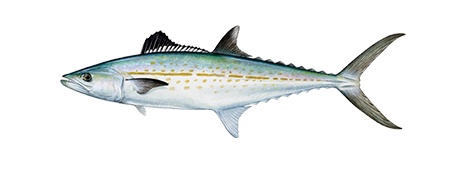
Cero Mackerel
Cero mackerel are popular game fish and are frequently taken by commercial fishermen.

Region
South, Northeast
Catch ease
Easy
Habitat
Bay, Ocean
How to identify a Cero Mackerel
Cero differ from the king mackerel and Spanish mackerel in having a pattern of both yellow spots, yellow-orange streaks, and a dark color line running the length of the body, and a lateral line that gradually curves down toward the caudal peduncle. The anterior third of the first dorsal fin is black like the Spanish mackerel. The pectoral fins are covered with small scales like the king mackerel. They are an epipelagic species that are most abundant in the clear waters around coral reefs, usually found solitary or in small groups.
Where to catch Cero Mackerel
While known from New England to Brazil, cero are primarily fish of the tropical and sub-tropical reefs. They are common throughout the Florida Keys, West Indies, and Cuba. It is the most common Scomberomorus in the West Indies. The following list includes additional details on where to catch this fish:
| Baitfish Patches |
| Birds |
| Coastal Waters |
| Floating Foam and Debris |
| Man-Made Structures |
| Reefs, Wrecks, and Shoals |
| Shore Points |
| Bays and Estuaries |
| Channel Entrances |
| Deep Shore Water |
| Jetties and Breakwaters |
| Merging Water |
| Rip Tides |
| Surf and Shore |
How to catch Cero Mackerel
They feed mainly on small schooling fishes, especially sardines, herrings, pilchards, anchovies and silversides and sometimes squids and shrimps.Fishing methods are identical for cero and Spanish mackerel. As with any mackerel fishing, fast trolling while looking for baitfish is a good way to find ceros. Common lures include small silver spoons and white jigs. They also hit surface swimming plugs, chuggers, and shallow running plugs. They have sharp teeth so a wire leader is essential. The following are fishing methods used to catch this fish:
| Drift Fishing |
| Chumming |
| Surf Casting |
| Saltwater Trolling |
| Fly Fishing |
| Bottom Bouncing |
| Still Fishing |
| Saltwater Jigging |
Cero Mackerel lures, tackle & bait
The following are lures, tackle or bait that can be used to catch this fish:
